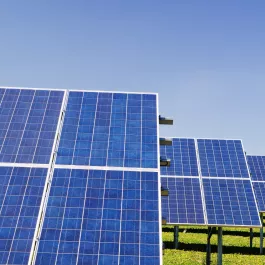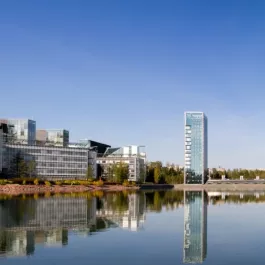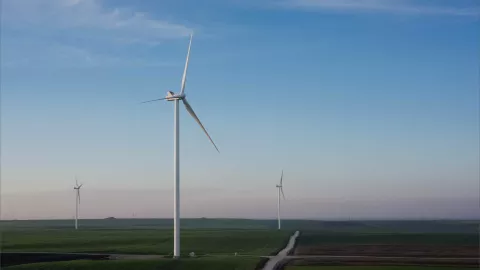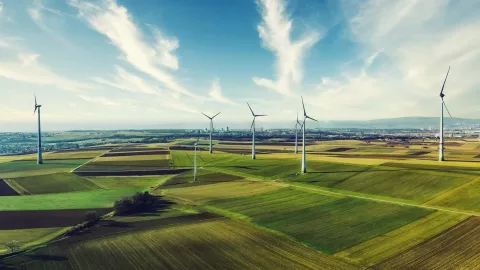The Paris Agreement established, for the first time, ambitious and global climate goals: “to keep the global average temperature rise well below 2 °C compared to pre-industrial levels and to continue making efforts to limit the temperature rise to 1,5 °C above pre-industrial levels”, as well as ensuring a neutral balance between the emissions and the removal through greenhouse gases (GHG) sinks, in the period from 2050 to 2100.
To achieve these goals, it is necessary to increase the current rate of decarbonization of the world economy by approximately five times, and the electricity sector will play a fundamental role in this transition, through the use of renewable energies and the promotion of electrification in the remaining sectors, in particular in transport, buildings (heating/cooling) and industry.
is an assumed commitment.
Know more
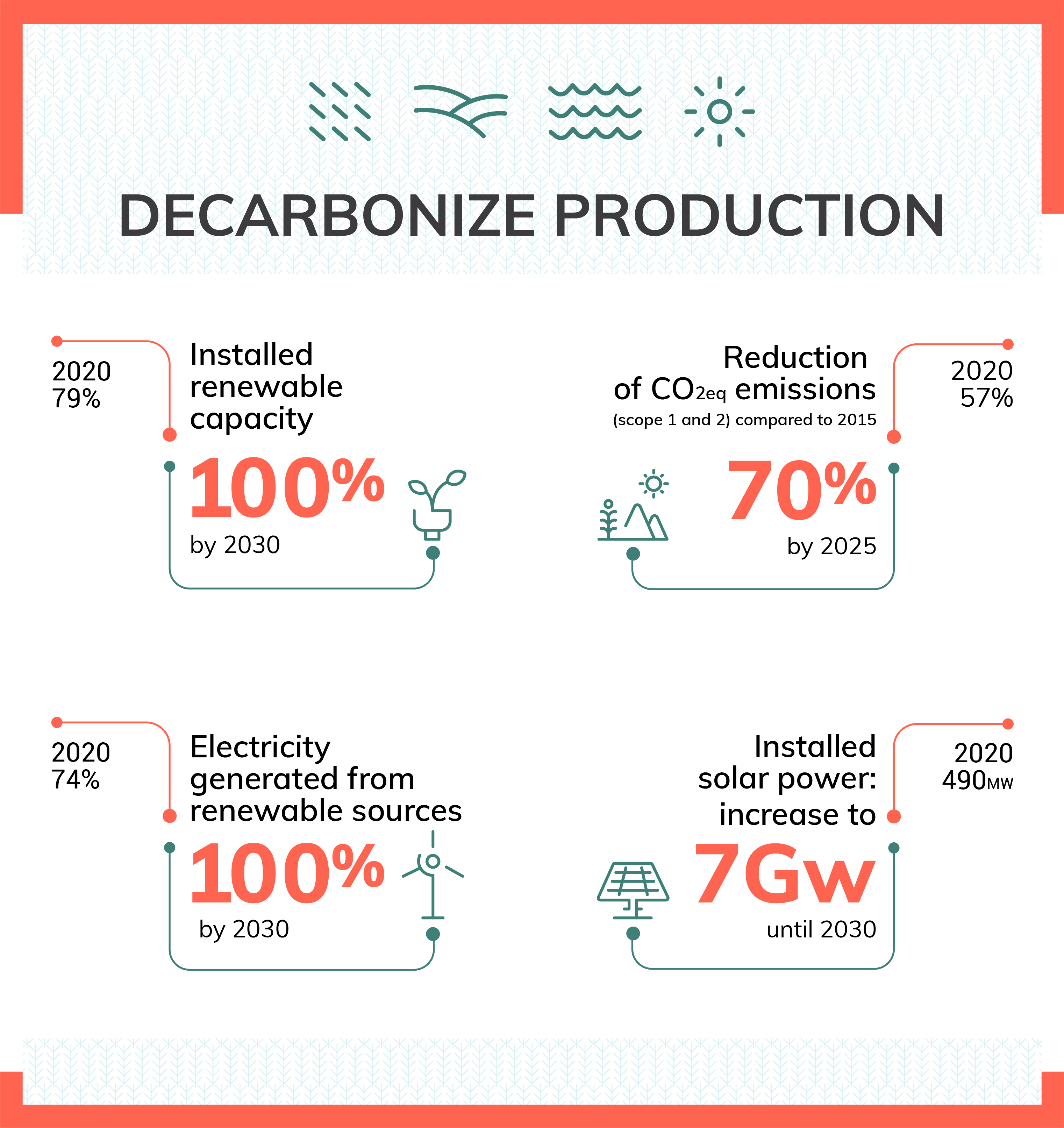

We want a future with less CO2 emissions
The CO2 emissions from our thermoelectric plants depend on numerous factors, including:
- Hydrological conditions, characterized by the Hydroelectric Productivity Index (HPI), which determine the greater or lesser use of hydroelectric plants;
- The mix of fossil fuels used (coal and natural gas);
- The market price of these fuels;
- The price of CO2 on the European Union Emissions Trading System;
- Taxes on fuel;
co2emissions

specific emissions

emissions by scope

thermoelectric plants
The interannual variation in specific CO2 emissions is essentially influenced by the increasing penetration of renewables and the impact of hydroelectric production in Portugal, which is highly dependent on the IPH.


(Location-based ²)
(Market-based ³)
Notes:
1 Detailed information on climate strategy and performance can be found in the response to the CDP - Climate Change and in the annual Report.
2 Based on global emission factors from different geographies.
3 Based on traders' emission factors.
Sustainability Commitments
We value international agreements and initiatives
Building a low-carbon future is not the responsibility of a single country, a single company or a single person. It is a work that is done together. Therefore, we are associated with several international initiatives that promote the leadership of the business sector in building a future where we all want to live.
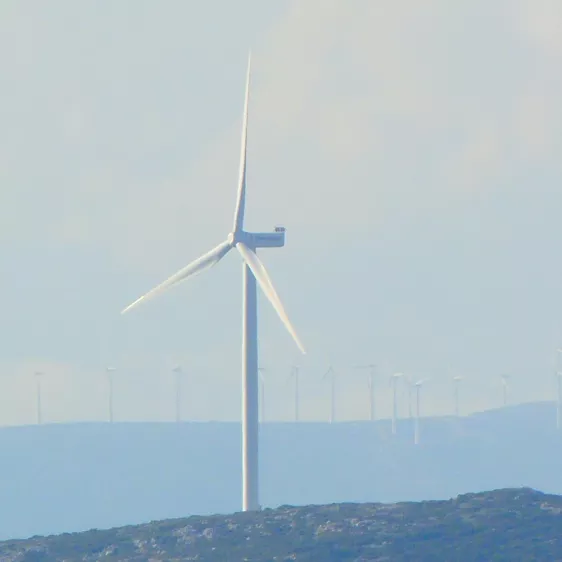
We are hand in hand with society
In addition to the many initiatives we have set in motion to decarbonize our activities, we work on an ongoing basis with society and our customers to raise awareness about the importance of reducing emissions and improve energy efficiency.
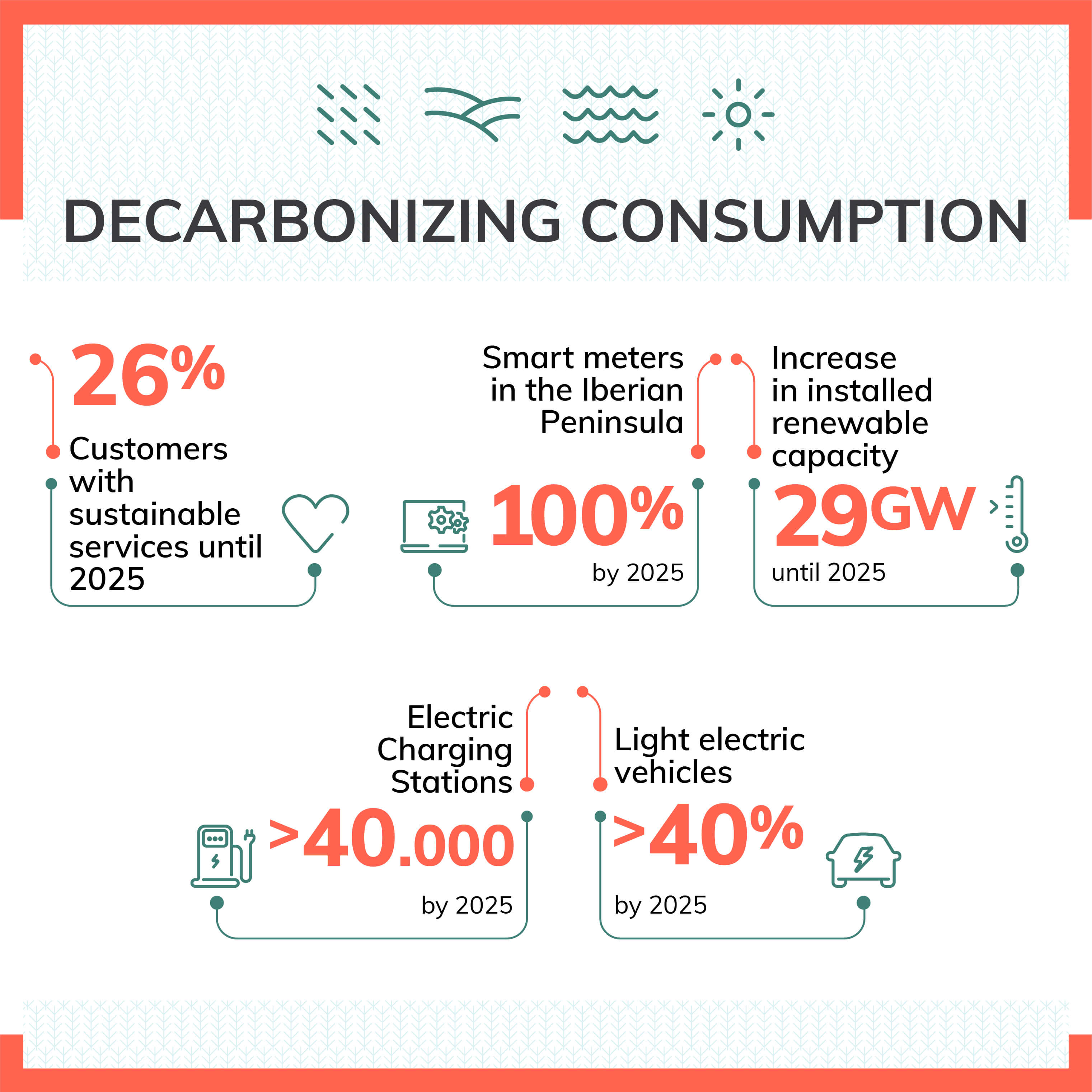

For the liberalized and the regulated market, we offer our customers a suite of solutions with competitive and sustainable products and services which avoid emissions in the end user's energy consumption.
"Energy Services Regulatory Guide" | "DSM and Energy Efficiency Initiatives 2020".
Electric mobility
Electric mobility is one of our strategic goals, as part of our commitment to sustainability and as an effective approach to tackle climate change. Therefore, we want to spearhead the transition to sustainable mobility and transport electrification.
To allow customers to charge their vehicles at home, we have launched Wallbox for condos in Portugal and Spain, domestic consumers in Spain and Brazil, and corporate customers in Brazil.
Decentralized Solar Energy
This activity has been strengthened by offering distributed generation solutions from renewable sources, namely solar photovoltaic, adapted to customers and local characteristics and according to different business models:
- direct sales to households and businesses, with a personalised installation service
- "as-a-service" solutions, in which EDP assumes the investment of the installation and owns the system for a determined period of time
- solar communities, which take advantage of available space in nearby buildings.
Currently with 436 MWp of installed capacity in decentralised solar systems on clients, EDP aims to reach 3.7 GWp by 2025. For this purpose, in addition to the geographies with supply activity (Portugal, Spain and Brazil), EDP is investing in this activity in the USA, Italy, Poland and Singapore.
New services and products
EDP has been launching several new products and services, as well as options for fully electrifying customers' homes with energy-efficient equipment, combined with the reconditioning or recycling of end-of-life equipment.
An example of these measures is EDP Smart, in Brazil, a platform that brings together the entire portfolio of products and services for business and domestic customers in the free market.
The Casa Eléctrica programme in Portugal, targeting B2C customers, aims to promote changing gas consumption to electricity, with an impact on energy consumption and safety, in alignment with the strategy of electrification of consumption. It is also worth mentioning the introduction, in the product range, of large energy-efficient appliances.
And, through Save to Compete, in Portugal and Spain, the offer of products and services for the business sector has already provided, since its launch in 2012, an accumulated saving of more than 600 GWh, avoiding the emission of approximately 170 thousand tonnes of CO2.
Additionally, with a focus on solutions that contribute to the decarbonisation of society, we have provided green tariffs through guarantees of origin from a renewable source or the compensation of CO2 emissions from gas consumption in dual customers.
Discover some projects offering innovative customer solutions
Get to know all the projects.
We are committed to decarbonizing our consumption
We at EDP know that we all play an important role in the sustainability of our planet, and we are strongly committed to decarbonizing consumption in our facilities.
For this reason, we have developed and implemented measures and projects to decarbonize our internal consumption. Get to know some of the goals and measures we have implemented:
Light-duty electric fleet
EDP has committed to electrify 100% of its light-duty fleet and 50% of its heavy-duty fleet by 2030.
Increasing the number of electric charges
We want to increase the number of electric car chargers in EDP buildings, as well to explore smart charging. To this end, we have installed a new technology at our headquarters, where we have more than a dozen charging stations connected to a backend cloud, which receives real-time data on the consumption of the entire building and on the solar energy generated by the photovoltaic system on the roof.
Reducing single-use plastics
Plastic is a material that has a huge impact on the environment, as it is not biodegradable. 8 million tonnes of plastic are dumped into the sea every year.
Because we monitor our environmental performance, we know that only 0.01% of the 862,000 tonnes of waste we produced in 2018 was plastic waste, and all of it was recovered (recycled and/or used for electricity production).
As for urban waste, and in order to comply with European laws and ensure the same level of responsibility in the various markets where we operate, we have committed to eliminating all single-use plastics within the EDP Group by 2022.
Using the sun's energy to power our buildings
We are committed to installing self-consumption solar photovoltaic systems in a significant number of administrative buildings in Portugal. To date, we have a total of around 550 kWp installed on 27 buildings.
